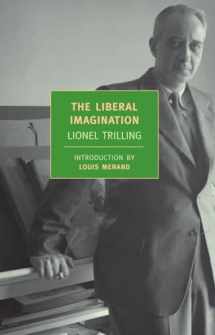
The Liberal Imagination (New York Review Books Classics)
ISBN-13:
9781590172834
ISBN-10:
1590172833
Edition:
Main
Author:
Lionel Trilling
Publication date:
2008
Publisher:
NYRB Classics
Format:
Paperback
320 pages
FREE US shipping
Book details
ISBN-13:
9781590172834
ISBN-10:
1590172833
Edition:
Main
Author:
Lionel Trilling
Publication date:
2008
Publisher:
NYRB Classics
Format:
Paperback
320 pages
Summary
The Liberal Imagination (New York Review Books Classics) (ISBN-13: 9781590172834 and ISBN-10: 1590172833), written by authors
Lionel Trilling, was published by NYRB Classics in 2008.
With an overall rating of 4.4 stars, it's a notable title among other
books. You can easily purchase or rent The Liberal Imagination (New York Review Books Classics) (Paperback) from BooksRun,
along with many other new and used
books
and textbooks.
And, if you're looking to sell your copy, our current buyback offer is $3.24.
Description
The Liberal Imagination is one of the most admired and influential works of criticism of the last century, a work that is not only a masterpiece of literary criticism but an important statement about politics and society. Published in 1950, one of the chillier moments of the Cold War, Trilling’s essays examine the promise —and limits—of liberalism, challenging the complacency of a naïve liberal belief in rationality, progress, and the panaceas of economics and other social sciences, and asserting in their stead the irreducible complexity of human motivation and the tragic inevitability of tragedy. Only the imagination, Trilling argues, can give us access and insight into these realms and only the imagination can ground a reflective and considered, rather than programmatic and dogmatic, liberalism.
Writing with acute intelligence about classics like Huckleberry Finn and the novels of Henry James and F. Scott Fitzgerald, but also on such varied matters as the Kinsey Report and money in the American imagination, Trilling presents a model of the critic as both part of and apart from his society, a defender of the reflective life that, in our ever more rationalized world, seems ever more necessary—and ever more remote.
Writing with acute intelligence about classics like Huckleberry Finn and the novels of Henry James and F. Scott Fitzgerald, but also on such varied matters as the Kinsey Report and money in the American imagination, Trilling presents a model of the critic as both part of and apart from his society, a defender of the reflective life that, in our ever more rationalized world, seems ever more necessary—and ever more remote.


We would LOVE it if you could help us and other readers by reviewing the book
Book review

Congratulations! We have received your book review.
{user}
{createdAt}
by {truncated_author}


